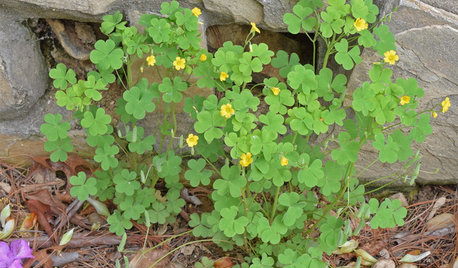Question about Foliar treatment of Fish Emulsion
Citrus Killer
6 years ago
Featured Answer
Sort by:Oldest
Comments (45)
Citrus Killer
6 years agoRelated Discussions
Fish/seaweed emulsion question.
Comments (8)How long would a dustbin sized fermentaion take in cold weather? Possibly forever. The idea of these gardening teas is to wash the microbes off of the compost and feed them in a warm environment to multiply them by 1000x. I have put in fresh seaweed, rotton tomatoes, some grass clippings, few handfulls of chicken manure pellets, a bucketful of worm casts, urine, a couple of whole oily fish cubed, and about 300g of molasses raw sugar and a small air pump and sir stone, and filled the whole thing up with water until about 3 inches from the top. A 30-gallon tank could use as much air as you can get. When the bacteria and fungi start to multiply, all their offspring need air too. It is not very hard to run out of oxygen. It's quite a thick mixture, and fairly difficult to stir, if this makes any difference to fermentation, i don't know? Something's wrong. It should not be thick. The thing is, it's quite cold here in Britain (Kent, England) at the moment, only around 10C or so. I'm guessing this would slow down the microorganisms and make the whole process last a long time? That is a problem. 10C is a bare minimum where the microbes start to come alive. Even warming it up by 5 degrees would really help. I've had this going for about 5 days now, and it doesn't look as though any of the solid matter is breaking down at all. If you get it just a little warmer, 24 hours should be the maximum time to leave it. Longer and you will lose oxygen and kill the beneficial microbes. Is the idea to wait until all or most of the solids are turned to a liquid mush? You know, rotted out more or less completely? I've never seen this before. Again, the idea is to wash off the microbes. Once that's done, you can remove the compost solids and put them back into your compost bin. New to all this organic growing, but very keen to learn. I put up a website for a guy who didn't have time (at the time) to put it up. Click here to see how he made his compost tea maker....See MoreFish Emulsion ? about application
Comments (7)Jim, are you using the FE strickly for fertilizer or an insect repellent? When I use for insect repellent, I measure 1 capful per 16oz mister..Shake well, then spray the entire plant. If you're using only for fertilizer, follow the container directions which is 2 tablespoons per gallon of water, then water plant..Either way, your citrus will be treated as a fertilizer, but as a foliar feeding, it'll work as a fertilizer and insecticide..It works simialar to oils, w/o chance of burn since it's organic. Toni...See MoreHow to use Fish Emulsion
Comments (29)I use it to give the plants a boost when I plant out. Also, I have some new beds this year that have quite a bit of organic matter that's still breaking down and could tie up nitrogen, so I use very diluted fish fertilizer when I water to try to make up for that while the organic matter breaks down (this is in addition to tomato/veg fert, which I apply regularly once fruiting starts). So far, plants seem happy, no sign of nitrogen excess or deficiency, but it's still earlyish. Because I just use tomato fertilizer on all my fruiting veg (just keeps thing simpler, fewer things to buy) I also use the fish fertilizer to supplement those plants that like a little more N than tomatoes. The fish fertilizer is good for leaf veggies. I don't foliar feed. I already do regular preventive spraying for fungal diseases and will spray if I have pest issues (thinking of adding a capsaicin product for squirrels and chipmunks), and too many things sprayed on the plants seems kind of silly, as it seems I'd constantly be washing off what I previously sprayed, etc., plus, more importantly, I'd spend ALL of my time spraying, which is not my favorite activity. Since I've never had problems with deficiencies when I apply fertilizer to ground/roots, I haven't yet felt a need to feed via foliage....See MoreFish emulsion vs Neptunes for pest control
Comments (3)Hey Barb... Fish Emulsion works wonders for me all summer, and I never have to worry about leaves burning too or to much build up of oils if used often that can suffocate leaves besides bugs..It has to be a good quality pressed cold one such as Neptunes Harvest... I find it most certainly deters pests before they ever start, but can take a bit longer to rid them if one is not consistent with using it when allowing bugs to take hold..I spray my plants every 2 weeks or so until they come in... I wish I could use that all year since it does not affect the leaves ability to grow properly when use as often as you would like while just enough oil deters mites and other sucking insects for me... I also love the Neem, but one has to be very careful with it, even though natural and it can kill blossoms and force fruit to drop suddenly......See MoreCitrus Killer
6 years agoCitrus Killer
6 years agoCitrus Killer
6 years agomyermike_1micha
6 years agoCitrus Killer
6 years agoSilica
6 years agolast modified: 6 years agoCitrus Killer
6 years agoSilica
6 years agojohnmerr
6 years agoSusanne Michigan Zone 5/6
6 years agoSusanne Michigan Zone 5/6
6 years agoSilica
6 years agolast modified: 6 years agoSusanne Michigan Zone 5/6
6 years agodchall_san_antonio
6 years agoSilica
6 years agodchall_san_antonio
6 years agoSilica
6 years agodchall_san_antonio
6 years agogardengal48 (PNW Z8/9)
6 years agodchall_san_antonio
6 years agogardengal48 (PNW Z8/9)
6 years agojohnmerr
6 years agomyermike_1micha
6 years agolast modified: 6 years agojohnmerr
6 years agolast modified: 6 years agoVladimir (Zone 5b Massachusetts)
6 years agoSusanne Michigan Zone 5/6
6 years agojohnmerr
6 years agomyermike_1micha
6 years agoSusanne Michigan Zone 5/6
6 years agoSusanne Michigan Zone 5/6
6 years ago
Related Stories

DECORATING GUIDES8 Wonderfully Creative Window Treatments
If regular curtains and rods feel too off the rack, look to these imaginative alternatives for one-of-a-kind windows
Full Story
DECORATING GUIDESYour Guide to Window Treatments
The right window treatments can provide privacy, light control and safety — or just better style
Full Story
MATERIALSInsulation Basics: What to Know About Spray Foam
Learn what exactly spray foam is, the pros and cons of using it and why you shouldn’t mess around with installation
Full Story
PETSSo You're Thinking About Getting a Dog
Prepare yourself for the realities of training, cost and the impact that lovable pooch might have on your house
Full Story
GARDENING GUIDESThe Truth About Bats: 3 Reasons to Love Them
It’s Halloween — time for spiders, black cats and bats. Here’s why we should appreciate, not fear, the nocturnal winged mammals
Full Story
HEALTHY HOMEWhat You Need to Know About Dust and How to Fight It
Breathe easier with these 10 tips for busting mites, dander and other microscopic undesirables
Full Story
KITCHEN DESIGNKitchen of the Week: Making Over a Rental for About $1,500
Fresh paint, new hardware, added storage, rugs and unexpected touches breathe new life into a Los Angeles apartment’s kitchen
Full Story
BEDROOMSHouzz Quiz: What Color Should You Paint Your Bedroom Walls?
Cool and soothing, or warm and spicy? Answer these questions and learn what hue is right for you
Full Story
GARDENING GUIDESWhat Your Weeds May Be Trying to Tell You
An invasion of weeds can reveal something about your soil. Here’s what is going on and what to do about it
Full Story
DECORATING GUIDESBling Where It’s Least Expected
Give your interior some sparkle and shine with metal tiles on a backsplash, shower or floor
Full Story



gardengal48 (PNW Z8/9)